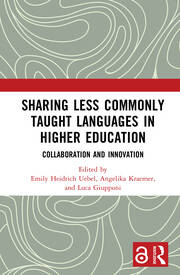Support For Less Commonly Taught Languages (LCTLs)
At our institution, we recognize the profound value of linguistic diversity and the importance of supporting languages that are less commonly taught (LCTLs). These languages open doors to rich cultural traditions, foster global understanding, and equip students with unique perspectives and skills that are increasingly vital in our interconnected world. This webpage aims to serve as a resource to advocate for the teaching and learning of these fundamental languages on our campus and beyond.
Less Commonly Taught Languages at Northwestern
The vibrant selection of less commonly taught languages on campus - including Arabic, Chinese, Czech, Ancient Greek, Hebrew, Hindi-Urdu, Japanese, Korean, Latin, Persian, Polish, Portuguese, Russian, Swahili, and Turkish- offers students a chance to dive into captivating cultures, unlock unique worldviews, and develop rare linguistic skills that set them apart in today’s global landscape.
COURSESHARE PROGRAM - BIG10 ACADEMIC ALLIANCE
If you are a Northwestern instructor interested in hosting a language course for BTAA CourseShare, please visit the webpage below for more information and FAQ on how to get started:
BTAA CourseShare for Instructors
LEARNING RESOURCES
WEBINAR | Sustaining and Strengthening Less Commonly Taught Languages in Precarious Times: Focus on Pedagogy and Placement
This webinar features presentations by LCTL educators and administrators from four Big Ten universities who will share innovative models for developing instructional materials, engaging students, and designing more equitable placement procedures for LCTLs.
WEBINAR | Sustaining and Strengthening Less Commonly Taught Languages in Precarious Times
Session recording, presenter slides and other resources can be found on the University of Wisconsin-Madison Language Institute website.
MANUAL | Sharing Less Commonly Taught Languages in Higher Education: Collaboration and Innovation
NATIONAL language centers focused on lctl
In 1990, the U.S. Department of Education established the first Language Resource Centers (LRCs) at U.S. universities in response to the growing national need for expertise and competence in languages. Currently, sixteen LRCs make up a national network of resources to promote and improve the teaching and learning of languages, including significant work on less commonly taught languages.
LRCs create language learning and teaching materials, offer professional learning opportunities for language instructors, and conduct and disseminate research on language learning and teaching. All LRCs engage in efforts that enable U.S. teachers, students and the public to better work, serve, and lead.
Empowering Language Educators: The Language Resource Center's National Network (The Language Educator, Spring 2024)
List of Title VI Language Resource Centers

